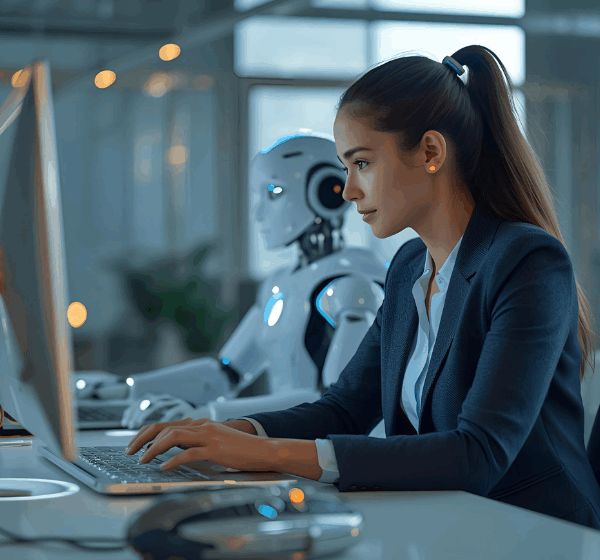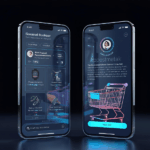
How AI is Redefining the Future of Work for Businesses
How AI is Redefining the Future of Work
The conversation about artificial intelligence in the workplace often swings between two extremes: a utopian vision of effortless productivity and a dystopian fear of mass job displacement. The reality, as it unfolds, is far more nuanced. AI is not just another tool; it’s a transformative force that is fundamentally reshaping job roles, required skills, and the very structure of how we work. For business leaders, understanding this shift is not optional—it’s essential for survival and growth.
This article will explore how AI is redefining the future of work. We will move beyond the hype and examine the practical impact on automation, skill requirements, and the creation of new roles. We will also provide actionable insights for businesses and individuals looking to navigate this new landscape and turn disruption into opportunity.
Beyond Automation: Augmentation as the New Standard
The most common narrative surrounding AI is one of automation, where machines take over human tasks. While this is certainly happening with repetitive, rule-based jobs like data entry or basic report generation, the more significant trend is augmentation. AI is becoming a collaborative partner that enhances human capabilities, rather than simply replacing them.
Think of an analyst who now uses an AI tool to sift through millions of data points in minutes, freeing them to focus on strategic interpretation and decision-making. Or a graphic designer who uses a generative AI platform to create dozens of initial concepts, allowing them to spend more time refining the final product. This human-machine collaboration boosts productivity and allows employees to focus on higher-value activities that require critical thinking, creativity, and emotional intelligence—skills that machines cannot yet replicate.

Actionable Insight:
Identify workflows within your organization where AI can augment, not just automate. Focus on tools that handle the repetitive parts of a job, empowering your team to apply their expertise more effectively.
The Mandate for Upskilling and Reskilling
As AI handles more routine tasks, the skills required for success in the workplace are changing. Proficiency in specific software or manual processes is becoming less valuable than a person’s ability to adapt, learn, and work alongside intelligent systems. This creates an urgent need for both upskilling (enhancing current skills) and reskilling (learning entirely new skills).
The future workforce will need a blend of technical and soft skills.
- Technical Skills: This includes data literacy (the ability to read, interpret, and communicate data), understanding how to interact with AI systems (prompt engineering), and basic knowledge of AI principles.
- Human-Centric Skills: As machines handle the technical, the value of uniquely human skills skyrockets. These include critical thinking, complex problem-solving, creativity, emotional intelligence, and leadership.
Organizations that invest in continuous learning and development programs will be better equipped to handle this transition. This means creating a culture that encourages curiosity and provides accessible resources for employees to acquire new competencies.
Actionable Insight:
Conduct a skills gap analysis within your organization. Identify which roles are most likely to be impacted by AI and develop targeted training programs to help those employees transition into new, more strategic roles.
The Rise of New Job Roles and Opportunities
While some jobs will be displaced by AI, history shows that technological revolutions also create new jobs—many of which we can’t even imagine today. The integration of AI into the business world is already giving rise to entirely new roles.
Some examples include:
- AI Ethicist: An expert who ensures AI systems are developed and deployed in a fair, transparent, and responsible manner.
- Prompt Engineer: A specialist who crafts the inputs for generative AI models to produce the most accurate and useful outputs.
- AI Trainer/Data Curator: Professionals who are responsible for cleaning, labeling, and managing the datasets used to train AI models.
- Automation Manager: A role focused on identifying and overseeing the implementation of AI-driven automation projects across an organization.
These roles sit at the intersection of technology and business strategy, requiring a hybrid skill set. Forward-thinking companies are not just waiting for these roles to emerge; they are actively creating them to build a competitive advantage.

AI as a Catalyst for Remote and Flexible Work
The recent shift toward remote work has been greatly enabled by technology, and AI is poised to accelerate this trend. AI-powered tools enhance collaboration and productivity for distributed teams in several ways.
For instance, AI can provide real-time language translation in video meetings, breaking down communication barriers for global teams. Project management platforms with AI capabilities can automatically track progress, flag potential bottlenecks, and even suggest optimal task assignments. Furthermore, AI-powered communication tools can analyze team interactions to provide insights into engagement and well-being, helping managers support their remote employees more effectively.
Actionable Insight:
Evaluate your current technology stack for remote work. Explore how AI-powered tools can solve specific collaboration challenges, such as communication across time zones or ensuring equitable participation in virtual meetings.
Navigating the Challenges of an AI-Driven Workplace
The transition to an AI-redefined future of work is not without its challenges. Businesses must address several key issues to ensure a smooth and equitable transformation:
- Ethical Concerns: Ensuring AI tools are free from bias, particularly in hiring and performance management, is critical.
- Change Management: Employees may be resistant to or fearful of AI. Clear communication and a focus on augmentation over replacement are essential to gaining buy-in.
- Data Security and Privacy: As more business processes are managed by AI, the need to protect sensitive company and employee data becomes even more paramount.
Conclusion: Embrace Adaptation and Lifelong Learning
The future of work is not a battle of humans versus machines. It is a future of collaboration, where AI augments human ingenuity to create unprecedented value. The companies and individuals who thrive will be those who embrace adaptation and commit to lifelong learning.
For businesses, this means investing in both technology and people. It requires building a robust digital infrastructure while simultaneously fostering a culture that encourages reskilling and prioritizes human-centric skills. For individuals, it means cultivating curiosity and taking ownership of professional development. By focusing on how AI can enhance our capabilities, we can navigate this transformation and build a more productive, innovative, and ultimately more human future of work.


